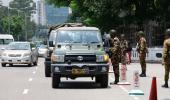Bangladesh's army chief General Waker-Uz-Zaman said on Monday that soldiers will return to barracks once the police resume normal operations, as he met and reviewed the security situation with the interim government head Muhammad Yunus.

Last week, Bangladesh descended into chaos after Prime Minister Sheikh Hasina resigned and fled to India in a military aircraft while the Army stepped in to fill the power vacuum.
As the news of Hasina's departure spread, hundreds of people broke into her residence, vandalising and looting the interiors, providing dramatic expression to the anti-government protests that have killed more than 300 people in a fortnight.
Soldiers will return to barracks once police resume normal operations, army chief General Waker-Uz-Zaman said while responding to journalists at an event.
He also said that there is improvement in the law and order situation in the country.
“If the situation continues to improve, all regular forces will carry out their counter-terrorism operations,” he was quoted as saying by the United News of Bangladesh news agency.
He said that 30 crimes against minority communities have been committed in 20 districts of the country.
He called upon the political parties to shun all violence and do politics for the people.
Earlier, he held a meeting with senior government officials including the Khulna Divisional Administration, District Administration, DIG, and KMP commissioner.
During the political turmoil, most police stations in the country, including the capital Dhaka, had no police personnel present.
Multiple police officers have reported that over four hundred police stations across the country have experienced attacks, vandalism, arson, and looting.
A police headquarters official said that the police have not faced such a situation since 1971, the report said.
Meanwhile, the protesting police officers in Bangladesh have agreed to call off their strike after the interim government assured them to meet most of their demands, according to media reports on Monday.
The Bangladesh Police Subordinate Employees Association declared the strike on August 6, following clashes across the country between police and students during the widespread protests against Hasina's government over a controversial quota system in jobs.
The clashes led to the fall of Hasina's Awami League-led government and forced her to flee to India.
Many police personnel did not return to work out of fear after the government's fall, and those who did went to their police stations in plain clothes.
The army chief also met with the chief adviser of the interim government, Prof Yunus, on Monday at the state guest house.
The meeting, which included senior Bangladesh army officers, focused on the nation's security and the role of the military in maintaining law and order.
According to sources from the chief adviser's office, Yunus expressed his satisfaction with the significant improvement in the country's law and order situation.
He praised the military for its active involvement in stabilising the situation.
Earlier in the day, Yunus also held a meeting with secretaries from over two dozen ministries.
During this session, he reviewed the progress of various development projects being implemented across the country.
Cabinet secretary Mahbub Hossain was present during the discussions.










